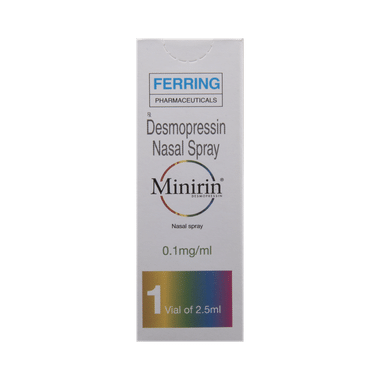-
Dpressin Nasal Spray (Rs.1541)
Composition: Desmopressin (0.1mg/ml)
All Details About Minirin Nasal Spray
Find out detailed description, uses, directions of use, side effects, warnings and precautions, frequently asked questions about Minirin Nasal Spray
Description:
Minirin Nasal Spray is used in the treatment of diabetes insipidus and bed-wetting. This medicine helps decrease the urge to urinate and help resume more normal life-style. It is generally used in patients who cannot take the oral form of medicine.Minirin Nasal Spray should be used as you have been advised by your doctor. Normally you should blow your nose gently before using it, keep one nostril closed while applying the medicine into the other and then sniff hard to make sure it reaches deep into the nose. Then repeat for the other nostril.
The most common side effects of this medicine include nasal discomfort, nasopharyngitis, nasal congestion, sneezing, headache, nausea, and cough. These are usually mild but if they bother you or do not go away, your doctor may be able to suggest ways of preventing or reducing them.
It is generally a safe medicine but, before taking it, talk to your doctor about any health problems you have such as heart problems or high blood pressure (hypertension) or overactive thyroid gland or glaucoma or prostate enlargement. Let your doctor know about any other medicines you are taking to make sure you are safe. Ask your doctor for advice before using this medicine if you are pregnant or breastfeeding.
Uses:
- Bleeding esophageal varices
- Diabetes insipidus
- Bed-wetting
Directions For Use:
Minirin Nasal Spray is a synthetic form of vasopressin (natural hormone that balances water). It is rapidly absorbed into the bloodstream through the inner surface of the nose. Once absorbed, it works by causing reabsorption of water from the kidneys which controls excessive thirst and urination in diabetes insipidus. It also helps decrease night-time urine production in multiple sclerosis.Side Effects:
Ordinary side effects of Minirin
- Nasal discomfort
- Nasopharyngitis (inflammation of the throat and nasal passages)
- Nasal congestion (stuffy nose)
- Sneezing
- Nosebleeds
- Dizziness
- Headache
- Nausea
- Cough
- Nasal discomfort
- Nasopharyngitis (inflammation of the throat and nasal passages)
- Nasal congestion (stuffy nose)
- Sneezing
- Nosebleeds
- Dizziness
- Headache
- Nausea
- Cough
Warning & Precautions:
No interaction found/establishedFAQs:
What precautions do I need to take while on Minirin Nasal Spray?
How long do I need to give Minirin Nasal Spray to my child for bedwetting?
Does Minirin Nasal Spray cure bed wetting?
Does Minirin Nasal Spray make you gain weight?
Is Minirin Nasal Spray a diuretic?
Written by:
Dr. T. Sharmila Krishna
M.B.B.S., MD (Biochemistry)
Reviewed by:
Dr. Sureshbabu Yadav
M.B.B.S., DIP.DIAB, F.R.S.H
Disclaimer:
Getomeds primary intention is to ensure that its consumers get information that is reviewed by experts, accurate, and trustworthy. The information and contents of this website are for informational purposes only. They are not intended to be a substitute for professional medical advice, diagnosis, or treatment. Please seek the advice of your doctor and discuss all of your concerns about any disease or medication. Do not disregard or postpone seeking professional medical advice because of something you read on Getomeds. Our mission is to support, not replace, the doctor-patient relationship.
